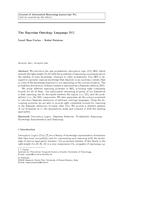The Bayesian Ontology Language BEL
From International Center for Computational Logic
The Bayesian Ontology Language BEL
İsmail İlkan Ceylanİsmail İlkan Ceylan, Rafael Peñaloza NyssenRafael Peñaloza Nyssen
İsmail İlkan Ceylan, Rafael Peñaloza Nyssen
The Bayesian Ontology Language BEL
Journal of Automated Reasoning, 58(1):67--95, 2017
The Bayesian Ontology Language BEL
Journal of Automated Reasoning, 58(1):67--95, 2017
- KurzfassungAbstract
We introduce the new probabilistic description logic (DL) BEL, which extends the light-weight DL EL with the possibility of expressing uncertainty about the validity of some knowledge. Contrary to other probabilistic DLs, BEL is designed to represent classical knowledge that depends on an uncertain context; that is, some of the knowledge may hold or not depending on the current situation. The probability distribution of these contexts is expressed by a Bayesian network (BN). We study different reasoning problems in BEL, providing tight complexity bounds for all of them. One particularly interesting property of our framework is that reasoning can be decoupled between the logical (i.e., EL), and the probabilistic (i.e., the BN) components. We later generalize all the notions presented to introduce Bayesian extensions of arbitrary ontology languages. Using the decoupling property, we are able to provide tight complexity bounds for reasoning in the Bayesian extensions of many other DLs. We provide a detailed analysis of our formalism w.r.t. the assumptions made and compare it with the existing approaches. - Forschungsgruppe:Research Group: AutomatentheorieAutomata Theory
@article{CN2017,
author = {{\.{I}}smail {\.{I}}lkan Ceylan and Rafael Pe{\~{n}}aloza Nyssen},
title = {The Bayesian Ontology Language {BEL}},
journal = {Journal of Automated Reasoning},
volume = {58},
number = {1},
publisher = {Springer},
year = {2017},
pages = {67--95},
doi = {10.1007/s10817-016-9386-0}
}
